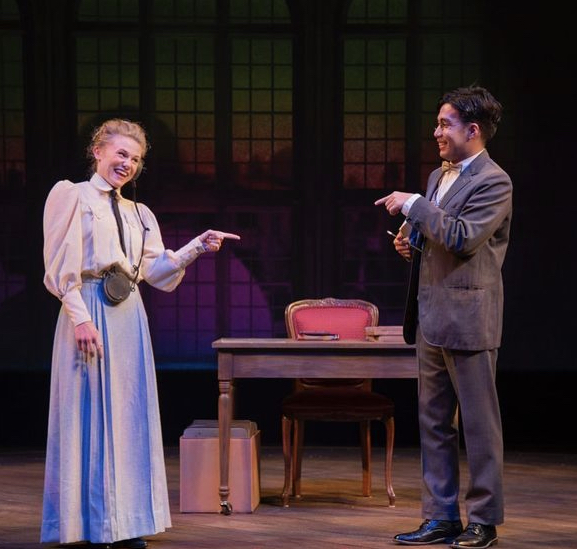
TU Theatre Department Mainstage Season Begins with Dazzling “Silent Sky”
By: Madeleine McComb, Contributing Writer
The Department of Theatre Arts at Towson University presents the story of a 1900s female astronomer, Henrietta Leavitt, in an excellently staged production of “Silent Sky,” a play by Lauren Gunderson.
Henrietta’s opening monologue is punctuated by the glow of a small ensemble of light bulbs hanging from the flies of the Mainstage Theatre. These bulbs are, of course, the stars to which Henrietta dedicated her life. They remain alight as we witness Henrietta’s journey from her home in Wisconsin into the world of the Harvard Observatory, where she made groundbreaking discoveries about the universe and changed the field of astronomy forever.
At the center of “Silent Sky” is Henrietta herself, played with energy, focus, and passion by EJ Roeder. Roeder is more than up to the challenge, and from her first starlit appearance onstage, she does a fantastic job leading the story and making us root for Henrietta.
Indeed, all five of the performers are very talented and effective. We also meet some of the other strong and inspirational women in Henrietta’s life: her sister, Margaret (Mel Gabel), and her colleagues, the no-nonsense Annie Cannon (the powerful Brooke Donald) and the occasional-nonsense Williamina Fleming (the scene-stealing Lindsay Wilk).
Eric Panuela plays Peter Shaw, Henrietta’s supervisor at the observatory, with a straight-laced awkwardness that is sometimes endearing and sometimes infuriating (that is an insult to Peter, not to Panuela, who is excellent in the role).
Peter later becomes a romantic interest to Henrietta. Frankly, this romantic subplot feels forced, mainly because Peter, unlike every other character in “Silent Sky,” was not an actual historical figure. However, Roeder and Panuela have excellent chemistry, and manage to create nice moments in a storyline that seems to exist mostly as filler. Their performances make it very easy for the audience to become invested in the relationship; as evidence, I present the group of girls seated at house right on opening night who audibly reacted at each twist and turn.
Of course, one cannot only credit those seen onstage, as “Silent Sky” also boasts an incredible crew of TU students and faculty, led by director and Theatre Arts faculty member Peter Wray. Other standout contributors are lighting designer Jay Herzog, who is responsible for those ever-important stars, and costume designer Julie Potter, whose costumes maintain the piece’s historical context.
The play ends how it began: with Henrietta alone, contemplating the glorious mosaic of stars and, with it, what the future holds for the characters we have met throughout the play and for the field of astronomy. It is beautiful and cathartic and has a great ending to a great play.
The Department of Theatre Arts at Towson University presents the story of a 1900s female astronomer, Henrietta Leavitt, in an excellently staged production of “Silent Sky,” a play by Lauren Gunderson.
Henrietta’s opening monologue is punctuated by the glow of a small ensemble of light bulbs hanging from the flies of the Mainstage Theatre. These bulbs are, of course, the stars to which Henrietta dedicated her life. They remain alight as we witness Henrietta’s journey from her home in Wisconsin into the world of the Harvard Observatory, where she made groundbreaking discoveries about the universe and changed the field of astronomy forever.
At the center of “Silent Sky” is Henrietta herself, played with energy, focus, and passion by EJ Roeder. Roeder is more than up to the challenge, and from her first starlit appearance onstage, she does a fantastic job leading the story and making us root for Henrietta.
Indeed, all five of the performers are very talented and effective. We also meet some of the other strong and inspirational women in Henrietta’s life: her sister, Margaret (Mel Gabel), and her colleagues, the no-nonsense Annie Cannon (the powerful Brooke Donald) and the occasional-nonsense Williamina Fleming (the scene-stealing Lindsay Wilk).
Eric Panuela plays Peter Shaw, Henrietta’s supervisor at the observatory, with a straight-laced awkwardness that is sometimes endearing and sometimes infuriating (that is an insult to Peter, not to Panuela, who is excellent in the role).
Peter later becomes a romantic interest to Henrietta. Frankly, this romantic subplot feels forced, mainly because Peter, unlike every other character in “Silent Sky,” was not an actual historical figure. However, Roeder and Panuela have excellent chemistry, and manage to create nice moments in a storyline that seems to exist mostly as filler. Their performances make it very easy for the audience to become invested in the relationship; as evidence, I present the group of girls seated at house right on opening night who audibly reacted at each twist and turn.
Of course, one cannot only credit those seen onstage, as “Silent Sky” also boasts an incredible crew of TU students and faculty, led by director and Theatre Arts faculty member Peter Wray. Other standout contributors are lighting designer Jay Herzog, who is responsible for those ever-important stars, and costume designer Julie Potter, whose costumes maintain the piece’s historical context.
The play ends how it began: with Henrietta alone, contemplating the glorious mosaic of stars and, with it, what the future holds for the characters we have met throughout the play and for the field of astronomy. It is beautiful and cathartic and has a great ending to a great play.
Rating: 4 out of 5 stars
“Silent Sky” is playing at the CFA Mainstage Theatre on October 19-22 at 7:30 pm, with a run time of 1hr 45min with one 10 minute intermission. Tickets are $22 regular price and $12 for Towson University students.

